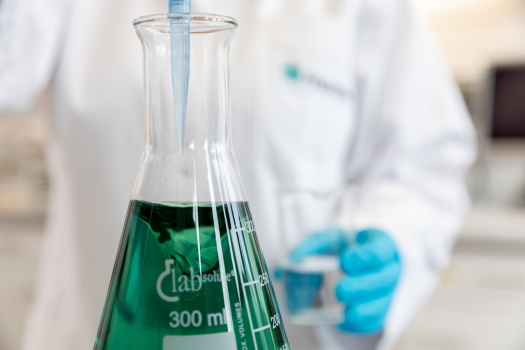Need for more environmentally-friendly gear lubricants

Environmentally harmless and rapidly biodegradable lubricant systems are particularly needed for applications such as ships' propellers and in the agricultural and forestry industries. Conventional lubricant systems for gear applications are generally based on mineral oil. They have poor biodegradability and their inadvertent release into the environment can contaminate soil and water. In addition, these fluids are a high fire risk, lead to unsafe and dirty working conditions, and their purchase and disposal are costly.
Water as the base medium for lubricant systems
The objective of the "Polymeric gear lubricant" project being funded by the Bayerische Forschungsstiftung is to develop a sustainable, water-based lubricant whose properties meet the special requirements required for gear drives. In contrast to traditionally used mineral oil based lubricants, water is cheap, harmless for the environment, non-flammable, and readily available. However, pure water is unsuitable as a lubricant due to its low viscosity and inadequate lubricating properties.
Adjustment of the viscosity using modified biopolymers
In order to achieve the necessary lubrication properties, biopolymers (based on carbohydrates) are added as a thickening agent. These are sustainable raw materials and have excellent viscosity-enhancing properties and high microbiological stability.
Within the project, the Fraunhofer IVV is testing the physical and microbiological stability of a variety of water-based biopolymer solutions as well as their rheological and tribological properties. The very high peak temperatures and stresses in gear drives also need research to be carried out into the mechanical-thermal properties of the polymeric fluids.
Due to previous research projects the Fraunhofer IVV possesses a wealth of knowledge about developing water-based lubricants. The institute received the German Raw Material Efficiency Award and the Joseph von Fraunhofer Prize 2012 for developing a commercial cooling lubricant.
Secondary plant substances as biogenic anti-abrasion additives
Lubricants generally contain various additives in order to meet the requirements for a specific application. It is essential to add anti-abrasion additives that form a protective film on the metal surface. Secondary plant substances (SPSs) that develop a protective interaction with the metal are the focus of additive development in the current project. Using extraction techniques, SPS-rich plant extracts are being recovered from raw materials and waste materials from the food and agricultural industries and then tested for their suitability as anti-abrasion additives in water-based gear lubricants. The focus is on sulfur-containing glucosinolates and also on phenolic compounds and alkaloids.
Optimization of the properties of secondary plant substances
The Fraunhofer IVV is developing efficient extraction and purification processes for recovering the relevant target molecules from a variety of raw materials. The recovered plant extracts and the secondary plant substances therein are being tested for their anti-abrasion effects. The development of the additives involves identification of synergistic effects between the individual groups of substances, determination of interactions between additives and the biopolymers, stabilization of the plant extracts in the base medium, and measurement of the service life under practical conditions.
The final part of the project will validate the newly developed lubricant in systematic tests and verify its suitability for specific gear applications.
Project term: |
2018 to 2020 |
Project management |
Bayerische Forschungsstiftung (Bavarian Research Foundation) |
Related project: |
 Fraunhofer Institute for Process Engineering and Packaging IVV
Fraunhofer Institute for Process Engineering and Packaging IVV